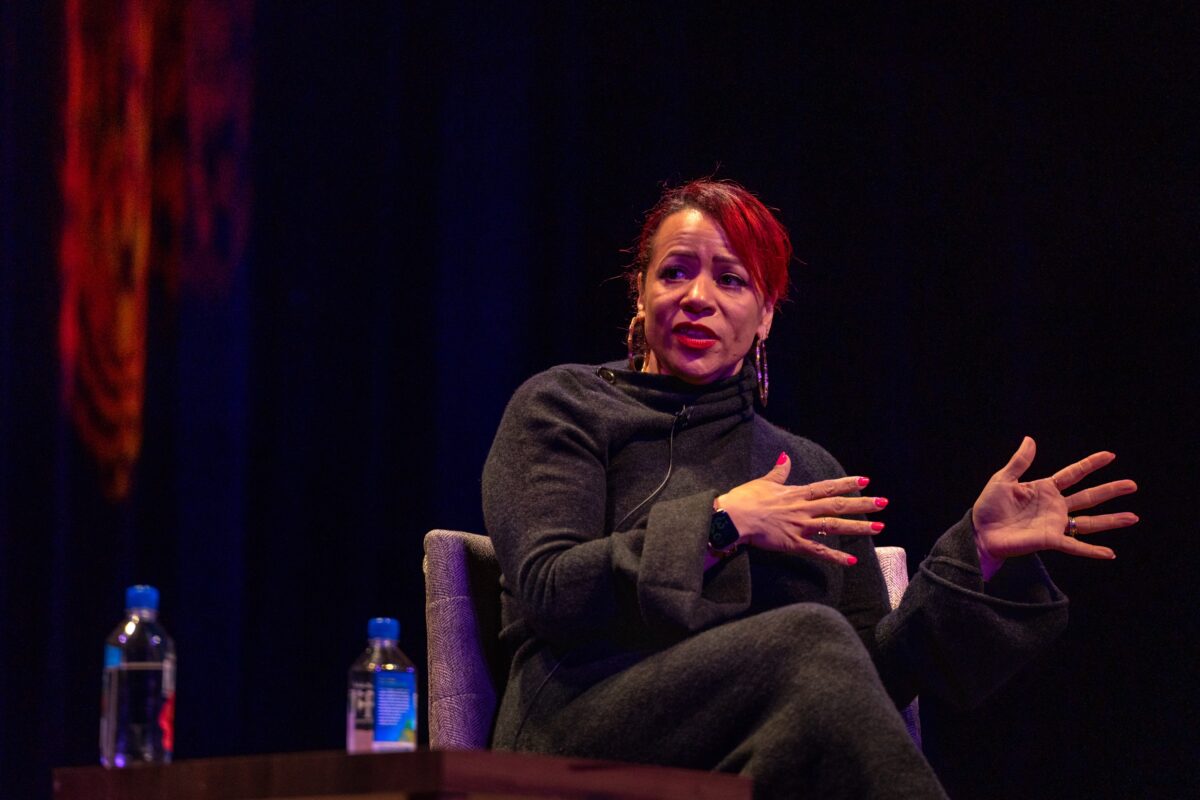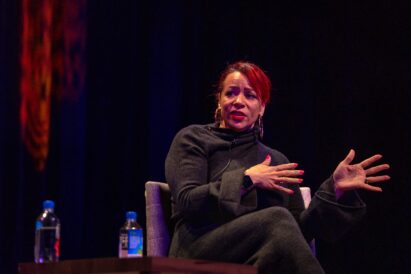1619 Project writer speaks at Weber State, pushes for more thorough look at slavery
- Nikole Hannah-Jones speaks at Weber State University as part of the Browning Presents series on Friday, March 31, 2023. Hannah-Jones is a Pulitzer Prize-winning journalist and the creator of The 1619 Project.
- Nikole Hannah-Jones, right, speaks at Weber State University as part of the Browning Presents series on Friday, March 31, 2023. Hannah-Jones is a Pulitzer Prize-winning journalist and the creator of The 1619 Project. KUER radio host Doug Fabrizio, left, prodded her with questions.
OGDEN — Learning as a teen that Africans had reached the shores of what is now the United States even before the pilgrims on the Mayflower gave Nikole Hannah-Jones a deep sense of pride.
At the same time, The New York Times writer and creator of The 1619 Project felt devalued. The Mayflower reached what is now Plymouth, Massachusetts, in late 1620 with a contingent of Pilgrims from England. That was a little more than a year after the arrival in August 1619 of the first enslaved Africans to reach the shores of what would become the United States aboard the White Lion.
“We were already here,” Hannah-Jones, who is Black, said during an address Friday at Weber State University. “It gave me a sense of pride that our lineage went back that far.”
Simultaneously, though, she harbored resentment and frustration at the sense of being marginalized as a Black person despite the deep roots of Africans in the country. KUER radio host Doug Fabrizio sat on stage with Hannah-Jones during her talk at Weber State’s Val A. Browning Center, prodding her with questions, and a contingent of students from the college also put a series of queries to the writer.
Learning about the White Lion “erased me,” Hannah-Jones said, noting years of feeling “demeaned and degraded” as a Black person in the United States only to learn “that there was this whole history that could be taught and people had chosen not to teach it to us.” She learned of the White Lion not as part of a school history class, but after reading a book that had been recommended to her by a teacher, “Before the Mayflower” by Lerone Bennett.
The experience stuck with her, leaving a seed that eventually led to publication of The 1619 Project by the New York Times Magazine starting in August 2019. The journalistic initiative has prompted praise and criticism and generated controversy as it recasts U.S. history more directly through the prism of slavery and the role slaves had in the nation’s development and evolution.
Hannah-Jones, though, is committed to spreading the word about the events of 1619 and, more generally, forcing a rethinking of the nation’s founding. History, she noted, can be “manipulated” and “managed.”
She never learned about the White Lion in a classroom growing up as a shy, nerdy bookworm in Waterloo, Iowa, “and I just realized at that moment that history is not what happens,” she said. “History is what we are taught about what happened, what we are called to remember about what happened, because the White Lion happened, 1619 happened. But we haven’t been taught that.”
She also reiterated her contention made as part of The 1619 Project that the descendants of U.S. slaves are owed financial reparations given the slave labor that figured in the nation’s development and the legacy of slavery that lives on in the form of racial inequality.
Unless there’s more “truth telling” and an “honest accounting” of U.S. history, accompanied by atonement and financial reparations, “we won’t be able to move forward,” said Hannah-Jones, whose remarks were received with periodic applause. “We will always be stuck in this polarized, unequal, divisive society that we have.”
Hannah-Jones, who won the Pulitzer Prize in 2020 for her work on The 1619 Project and joined Howard University as the inaugural Knight chair in race and reporting in 2021, took aim at some sacred cows for conservatives and others.
She poked holes in the notion of U.S. exceptionalism. “We are exceptional. We have exceptional inequality in this nation. We do,” she said, pointing to relatively high U.S. incarceration rates, high rates of child poverty and limited access to health care for some.
She also targeted what some view as the infallibility of the nation’s Founding Fathers, people like Thomas Jefferson, George Washington and James Madison.
“They weren’t demigods. They were deeply flawed human beings, were compromised, like many people are compromised,” she said. Apart from their role in the founding of the country, she went on, “these men wanted to make money and they made money off of slavery.”
It’s not that people like Jefferson didn’t do worthy things, she said. They did. It’s just that there’s more to the story that, as Hannah-Jones sees it, deserves to see the light of day.
“We’ve only wanted to tell one of those stories, and I’m just staying we have to tell it all,” she said.




